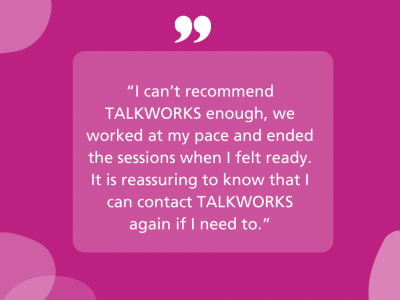- Home
- Anxiety
- Depression
- Emotional Eating
- Living With a Long Term Health Condition
- Loneliness
- Menopause
- Mindfulness
- OCD
- Panic Attacks
- Phobias
- Pregnancy & Parenthood
- Prolonged Grief (Grieving)
- PTSD
- Sleep Difficulties
- Stress
- Needs We Can and Cannot Meet
- Cognitive Behavioural Therapy (CBT)
- Eye Movement Desensitisation & Reprocessing (EMDR)
- Employment Support
- Counselling for Depression
- Online Self-help
- Mindfulness
- Wellbeing Workshops
- Join the team
- Become a volunteer
- What to expect at your first appointment
- Testimonials
- Learn about mental health
- FAQs
- Mental Health Resources
- Blog
- Video Appointments
- Your feedback
- Making contact if you are deaf
- I need help now
Access support from TALKWORKS
Self-refer
Perinatal Mental Health and The Support Available
Having a baby is a big life event. It's natural to experience a range of emotions during pregnancy and after giving birth during this period of change. But, if any difficult feelings start to have a big effect on your day-to-day life, you may be experiencing a perinatal mental health problem. This could be new, or it could be an episode of a problem you've experienced in the past. Either way, if you are finding things hard and struggling to cope, it is important to reach out for help and ensure you are supported.
Perinatal Depression
If you experience depression during the time of your pregnancy, or after giving birth, this may be known as either:
- Antenatal depression– persistent low mood and sadness that women can experience while they are pregnant
- Postnatal depression (PND) – the period from when you give birth to roughly two years after you have had your child
- Perinatal depression – this covers any time from becoming pregnant to around one year after giving birth.
Lots of people are aware of the term ‘postnatal depression.’ But it is less known about antenatal depression, and some people may experience both.
What are the signs and symptoms of perinatal depression?
If you have Perinatal Depression you may experience a range in emotions, including low mood, feeling worthless, angry, tired, guilty, shameful, irritable and tearful. You may have a lack of motivation, loss of interest in activities, poor appetite, difficulty sleeping, loss of confidence, avoidance and reduced concentration. You might also experience negative thoughts such as, ‘I can’t be bothered’, ‘I am a bad parent’, or ‘nothing I do is ever good enough’.
What is the difference between depression and the baby blues?
The 'baby blues' is a brief period where new parents may experience low mood or feel emotional, around three to 10 days giving birth. This is very common and effects around 7/10 women. Having a child is a huge lifestyle change, and results in new demands, challenges and changes in relationship. Lack of sleep can also play a huge part in low mood and sadness, as well as hormonal changes, so it is completely natural to feel emotional and overwhelmed during this time. If low mood persists longer than 10 days however, it could be indicator of postnatal depression. It is important to note that this does not just effect new mums, but also dads and other care givers, in the perinatal period.
What is anxiety?
Anxiety is a very normal human experience, and a small amount of anxiety can actually be useful to either motivate us or protect us from danger. However, as with anything, too much anxiety can be problematic when it becomes excessive, uncontrollable and impacts on day-to-day life.
If you are experiencing anxiety during or after pregnancy, you may feel a number of emotions, including on-edge, tense, short of breath, nauseous, light headed, feel hot or cold and you also may experience aches and pains. You may find you are avoiding situation or places, constantly seeking reassurance, checking yourself or your baby or having difficulty sleeping.
You might also have anxious thoughts such ‘what if I can’t cope?’, ‘what if something goes wrong with my baby or the birth?’, ‘what if I drop the baby down the stairs?’ or ‘I am going to faint/have a heart attack’.
There are lots of different types of anxiety and different people will have different experiences of it, but it’s important to know that if you are struggling, there is help available.
How can TALKWORKS help?
Here at TALKWORKS we understand how having a baby can have an impact on your mental health. We therefore offer a fast track service for women in the perinatal period so we can begin supporting you as soon as possible. TALKWORKS can offer support and treatment either via a one to one appointment, or as part of a group therapy session. We can carry out our appointments remotely, so that you can attend from a time and location that’s convenient to you. We also offer (limited) face to face appointments where you can access treatment from one of our five bases across Devon.
Cognitive Behavioural Therapy (CBT) is one of the main treatment options that we use here at TALKWORKS. CBT is an evidence based treatment which is used to treat a number of different common mental health problems, including depression and anxiety. It has a present focus on the here and now, focusing on the symptoms that are troubling you and how we can work with you to help you feel better.
Our therapists can teach you useful skills and techniques to enable you to overcome some of the difficulties you are experiencing, including relaxation techniques, refocusing and breathing techniques. We offer treatment for obsessive compulsive disorder (OCD), Tokophobia (fear of giving birth), birth trauma or trauma triggered by the perinatal period, as well as more common mental health problems such as depression, anxiety and sleep deprivation.
Please call TALKWORKS on 0300 555 3344 for an assessment, or self refer online, if you and your partner are finding the perinatal period difficult. Our Psychological Welbeing Practitioners will listen to you in a non-judgemental and confidential environment and are here to support you in your journey into parenthood. Remember that you do not need to go through this on your own. We are here to help.
Related Posts

Administrative professionals day – thank you to our admin staff
Posted by Victoria Walmesley on 23 April, 2025

Karen gives thanks to TALKWORKS
Posted by Admin on 14 April, 2025

